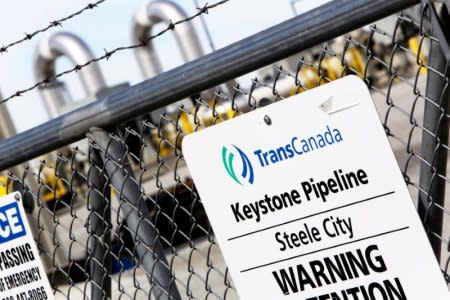Keystone XL pipeline route would not harm environment - U.S. State Dept

Thomson Reuters
By Timothy Gardner
WASHINGTON (Reuters) - The U.S. State Department on Friday issued an environmental assessment of a revised route for the Keystone XL crude pipeline that concluded it would not harm water or wildlife, clearing a hurdle for the project that has been pending for a decade.
Even if the pipeline spilled crude oil along its revised route through Nebraska, a top concern of environmentalists, there would likely be no impact to groundwater, the nearly 340-page draft review said.
"Prompt cleanup response would likely be capable of remediating the contaminated soils before the hazardous release reaches groundwater depth," the review said.
Last month a federal judge in Montana had ordered the State Department to conduct the review of a revised route of the project to take into account new information relevant to a permit it issued for the pipeline last year.
The review also said implementing the revised route would have "no significant direct, indirect or cumulative effects on the quality of the natural or human environments."
U.S. President Donald Trump is eager to see the building of the pipeline, which was axed by former President Barack Obama in 2015 on environmental concerns relating to emissions that cause climate change.
The project has galvanized environmentalists, tribal groups and ranchers in opposition to the $8 billion 1,180 mile (1,900 km) pipeline that would carry heavy crude from Canada's oil sands in Alberta to Steele City, Nebraska. From there the crude would be sent to refineries and potentially for export.
Canadian oil producers, who face discounts for their crude due to transport bottlenecks, U.S. refineries and pipeline builders, support the project.
TransCanada Corp plans to start construction in 2019, spokesman Matthew John said.
The company's Chief Executive Russ Girling said last month that it could make a final investment decision on the project late this year or in early 2019, pending some regulatory approvals and court challenges.
Robert Kwan, an RBC analyst, said the draft review was a "positive step" for Keystone XL.
Environmentalists said the review was an example of the Trump administration trying to push through a project that would risk harming water resources and increase dependence on crude.
"We've held off construction of this pipeline for 10 years, and regardless of this administration's attempts to force this dirty tar sands pipeline on the American people, that fight will continue until Keystone XL is stopped once and for all," said Kelly Martin, the Beyond Dirty Fuels campaign director for Sierra Club.
(Reporting by Timothy Gardner in Washington; additional reporting by Rod Nickel in Winnipeg, Manitoba)
See Also:

 Yahoo News
Yahoo News 
